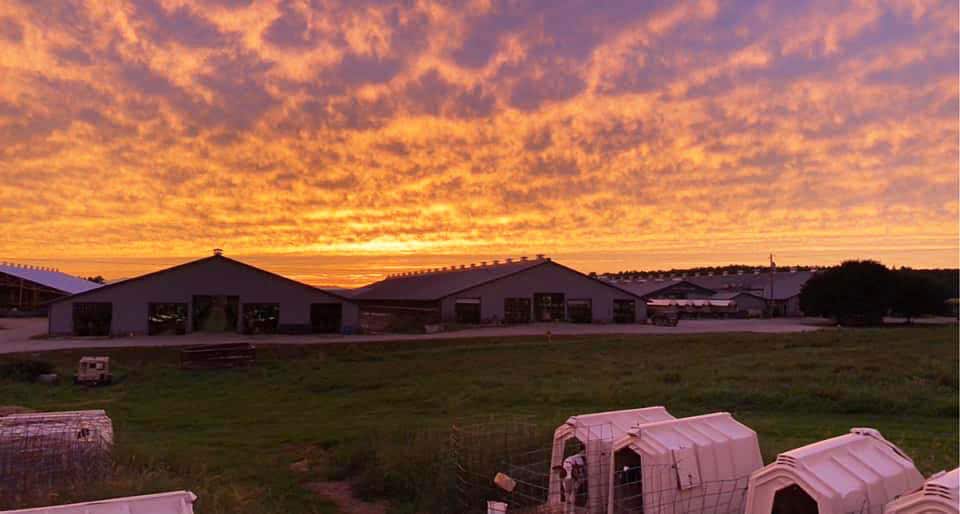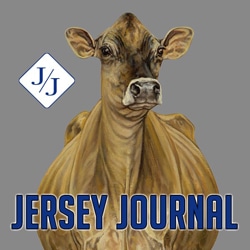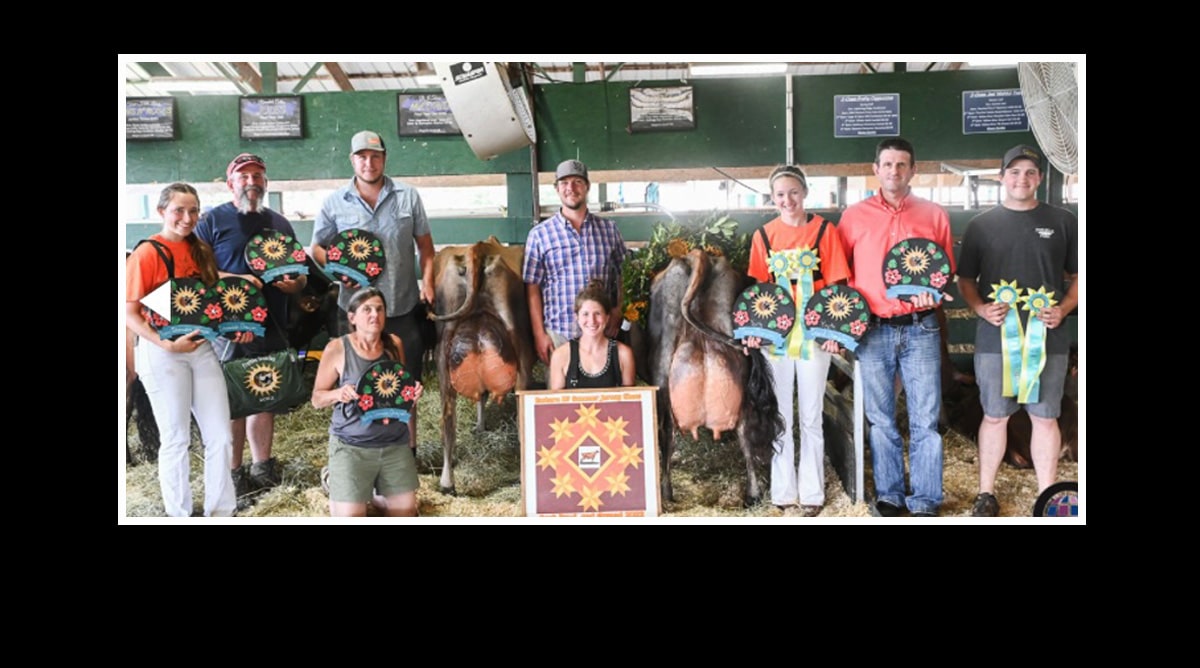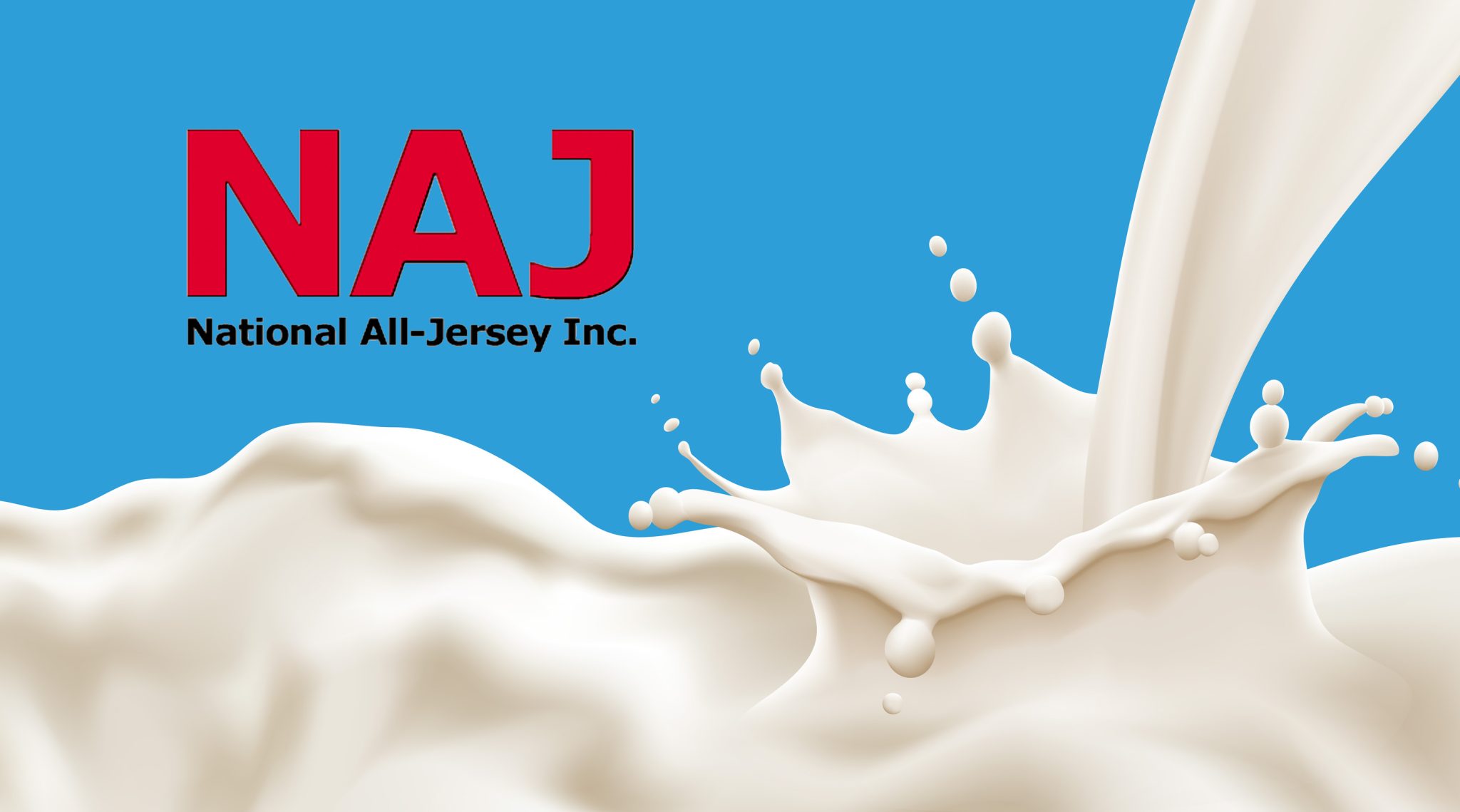Jersey Genetics are Thriving in Vermont
Megan Hill, a third-generation dairy farmer, is the herd and genetics manager for her family’s dairy, Four-Hills Farm, in Bristol, VT. In addition to managing her family’s more than 2,000 head dairy herd, Megan is also a Jersey Youth Academy Class IV alumni, a director for the Vermont Jersey Breeders Association, and has served on the sale committee for the New England Jersey Breeder’s Sale.
In recent years, the Four-Hills prefix has become recognized across the country on the national show circuit exhibiting Ayrshires, Holsteins, and Jerseys.
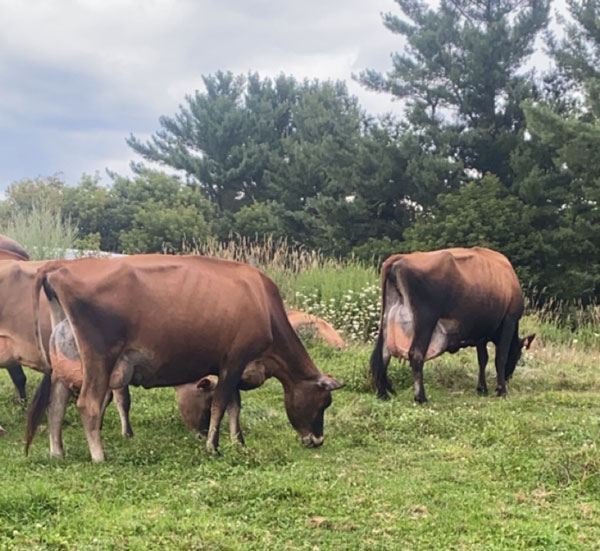
Megan began her experience in the show ring as soon as she could. As a pee wee showman, Megan’s parents decided to start her with a Jersey heifer. At this point, Four-Hills did not have any Jersey calves at the farm, so Megan picked out a small heifer named “Reese’s Pieces” from another farm. “ Reese’s Pieces” lived to be 14-years-old, and provided Megan and family with several daughters to show over time. When Megan first started showing in 4-H and open shows, Jerseys were not the main focus of all the breeds at Four-Hills.
“The farm was doing big things in the Holstein and Ayrshire rings, but had just started to buy and exhibit Jerseys,” said Megan. “I fell in love with Jerseys during my time in pee wee. And because my two older cousins were already well established with our best Ayrshire and Holstein families, the Jerseys kind of fell into my lap, so I ran with it!”
Four-Hills has only grown more successful since that time. Milking over 2,000 cows, it is one of the largest dairy operations in New England. With a farm this large, the Hill family has worked hard to ensure the longevity of the family operation. Megan says that the second generation on the farm has been supportive and more than willing to let the third generation join the ranks as valued members of the team.
Management Strategies at Four-Hills
“Generational transfers are hard,” explained Megan. “Many families struggle with that transition. I think the planning we’ve done and are working toward, will help make the transition from second to third generation go smoothly.”
As part of the farm transition, Megan and her cousin, Britney, have taken on the role of herd managers since returning from college.
Megan also discussed the challenges of managing such a large mixed herd. She says that Holsteins make up 95% of the total herd, which means that much of the equipment and barn space is designed for Holsteins. As the herd has grown, Four-Hills now milks the Jerseys and the Ayrshires in their own group rather than alongside the Holsteins. They decided to make this switch to increase efficiency in the parlor while reducing injuries to the milking cows.
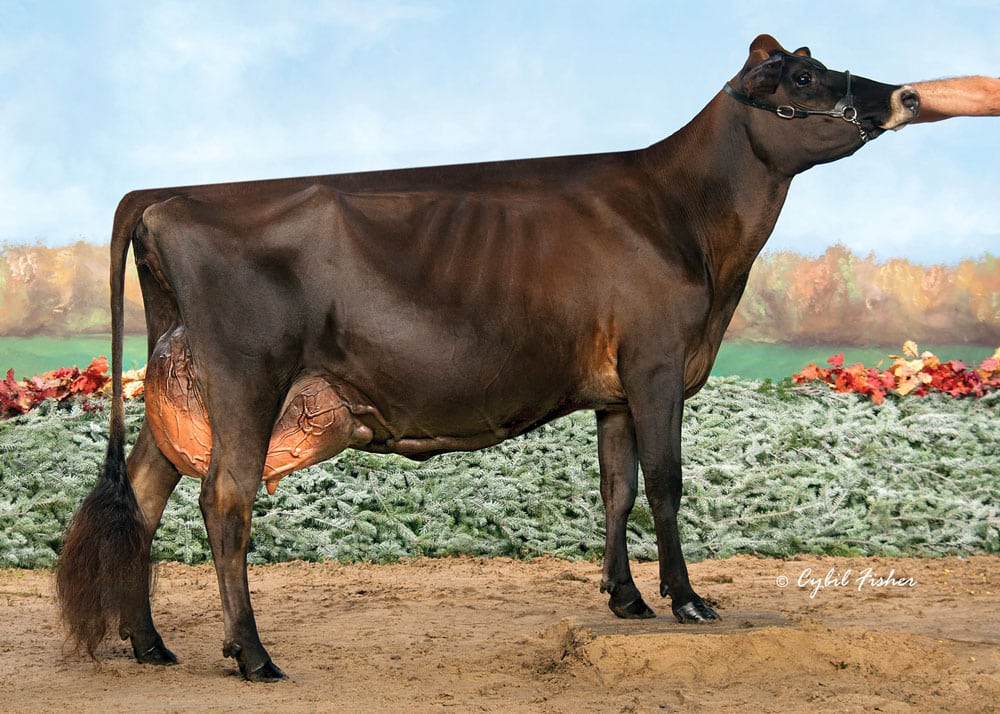
Nutrition is another driving factor for grouping the milking herd by breeds. They wanted to feed the Jerseys a ration appropriately built for them to increase production and keep them in shape. While mixing new rations has proven to be challenging for the farm, Megan is still hopeful for the outcome.
As the genetics manager at Four-Hills, Megan spends much of her time making the breeding decisions for the farm. She mates all of the Jerseys individually according to their genetic needs. She aims to breed for production at least every three generations, while still maintaining the large, stylish frame, that is a trademark of Four-Hills show Jerseys. The Holstein breeding at the dairy looks slightly different. Those dairy cows are categorized and bred based on cow type—genomic, red, or angus mating. From there, they are bred using bulls Megan has pre-selected to use in that category for the current proof run.
While managing such a large herd, Megan has seen first-hand the efficiencies Jerseys have over the Holsteins. In trying to customize Jersey-specific rations, the farm has noted that less feed is consumed by the Jerseys, resulting in less manure. Naturally, a smaller breed requires less space per cow which saves room in the barns and pastures.
Four-Hills ships their milk to Agri-Mark, and they are paid based on pounds shipped with bonuses for fat, protein, and quality. Given that the Jerseys produce higher amounts of fat and protein, this presents a major advantage for the farm. Most co-ops have applied a milk quota for dairy farmers, capping the amount of milk that farmers can sell. Megan says that this provides incentive to switch to–or add more–Jerseys in order to stay under base while still increasing fat and protein shipped.
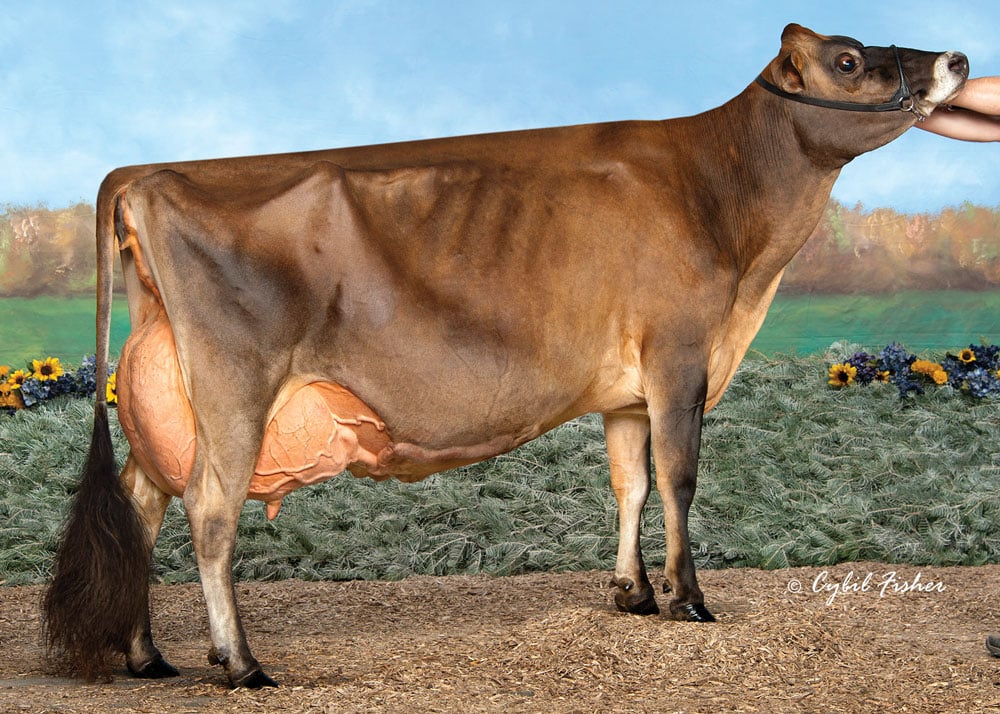
Given these efficiencies, the Hill family is thankful Jerseys were added to the operation. Megan says her grandmother always liked Jerseys, so one year for Mother’s Day, Megan’s father and his siblings surprised her with a Jersey calf. As any typical Jersey project does, it multiplied quickly. Megan’s father bred them using mainly type bulls for many years. Much of the Jersey herd on the farm goes all the way back to these original family lines.
“The show families that everyone knows Four-Hills for today stem from a longtime family friend, Joe Allen,” explained Megan. “Between 2005- 2010 we purchased some show heifers from him. One of which was Kellogg-Bay Amedeo Gladys-ET. She essentially made up my entire Jersey junior show career and has daughters, granddaughters, and great-granddaughters all over the U.S. performing exceptionally well in their classes.
“In 2005, Joe saw a winter calf at a sale and told my uncle about her; she ended up being DF Sultan Burganne. She won her heifer class both years at World Dairy Expo and was also named Junior Champion in 2007. Her daughters, Four-Hills 1st Blue 3241-ET and Four-Hills Response Bahama-ET, have done extremely well in the show ring. “Bahama” has turned into a tremendous brood cow with two daughters topping the spring yearling class at World Dairy Expo last year.”
Needless to say, from one Mother’s Day surprise, Four-Hills has produced a long line of show-stopping Jerseys who not only perform well in the show ring, but who have also proven to be an advantageous addition to the milking herd.
Dairy Farming in the Northeast
Farming in Vermont comes with many pros and cons. Though New England is not as known for its dairy industry, it is still home to approximately 1,000 dairy farms. The close proximity to Boston and New York City are large advantages for farms in New England like Four-Hills. The population is dense in these urban areas, and people are generally interested in understanding where their milk comes from.
Unfortunately, many people are far removed from farms and find research on the internet as truth. This affects not only the general public, but also lawmakers who are creating policies for dairy farmers. Megan says that as the times change, Four-Hills has made strong efforts to engage with their local community and show them what they do and why they are passionate about it. Many New England dairy farmers are doing the same, as this allows them to build trust with and educate their surrounding communities.
Megan is proud to be part of the Four-Hills team as a third generation dairy farmer. Her goal has always been to return to the farm even though she knew farming with family would not be easy, especially with five grandchildren—herself included—going back to the farm at once.
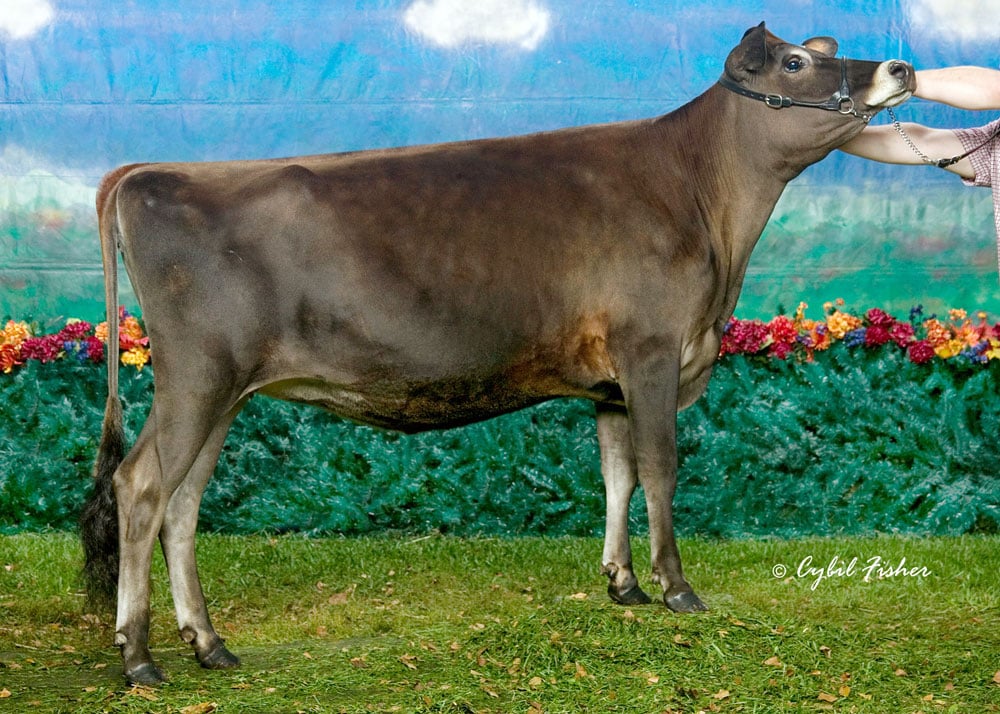
“It’s really hard to change the mindset of ‘that’s the way it’s been done for years,’ doesn’t mean it still needs to be done that way,” said Megan. “Fortunately, I think the generation ahead of us has been open to the ideas and practices we’ve come up with. Sure, there is usually push back, but the older generation usually let us try [new methods] with the mindset that mistakes are the only way to learn.”
Building a Strong Dairy Future at Four-Hills
Since the show ring is not the main focus of the farm, the family does not buy show animals–they breed them. Megan is proud of the success that Four-Hills has had in recent years. At the 2021 World Dairy Expo, the dairy was named Premier Breeder of the Jersey heifer show. Winning Premier Breeder was quite a reassuring and unforgettable moment for Megan because it meant as genetics manager, she has created cattle for the dairy to build their reputation with.
Megan’s breeding expertise has also been proven in her personal herd separate from the family farm. Megan’s first bred and owned cow carrying the “M” in her prefix, Four-Hills M Fancy Victory, recently scored 89 points as a two-year-old. Needless to say, this was yet another proud moment for Megan, and she is looking forward to seeing what else the “M” line will produce.
Four-Hills faces the uncertain future with positivity. Unsure of what the current quota system in the northeast will mean for milk prices in the future, the farm is holding off on expansion for now. However, as Megan and her cousins are becoming more involved in the farm, they are hopeful to continue growing the herd in the future. In the last year, Four-Hills has been updating facilities to maximize milk as well as quality of milk from the cows they currently have. Additionally, the family is looking into different avenues of income for Four-Hills. For example, Megan has had great success on the genetics side of the operation and plans to continue to improve and increase revenue for the farm.
Megan’s drive and passion for the Jersey industry are evident to all who meet her, and she is a tremendous encouragement for young people who have considered moving back home to the family farm. She is bringing her knowledge, expertise, and experiences gained in college and throughout her life to help grow Four-Hills into an even more successful operation than it already is. The future for dairy farms is never certain, but Four-Hills will stand strong as a new generation learns from the wisdom of their parents while integrating new methods and ideas.
